![[Metroactive Movies]](/gifs/movies468.gif)
[ Movies Index | Show Times | Santa Cruz | Metroactive Home | Archives ]
You Shall Be Known by the Company You Keep
'The Corporation' shocks and disturbs in the way it's able to get full disclosure from high-powered people about the darkest corners of the corporate world. Co-director Mark Achbar talks about how he was able to capture it all without losing his power lunch.
By Steve Palopoli
The Corporation opens with the following narration: "150 years ago, the business corporation was a relatively insignificant institution. Today, it is all-pervasive, like the church, the monarchy and the Communist Party in other times and places. The corporation is today's dominant institution. This documentary examines the nature, evolution, impacts and possible futures of the modern business corporation."
Yikes. You can already hear some of the audience shifting uncomfortably in their seats. In an era of celebrity filmmakers like Michael Moore and Super Size Me's Morgan Spurlock, where personality-driven pieces are the hottest thing going, any documentary that opens with the phrase "150 years ago" and then launches into a four-part thesis sentence is going against the grain.
And indeed, The Corporation is, at one level, a classic "think piece," and it does deliver exactly what it says it's going to deliver in the opening narration, picking apart the question of what exactly a corporation is and how it got to be that way. If corporations are screwing us, the film says, it's because we set them up to do just that.
"I think the point we were making in there," says co-director Mark Achbar, "was that they cannot [legally] do good for goodness' sake. Any extracurricular activities that they take to benefit society must be justified in terms of the bottom line. Otherwise they are violating what is called their 'fiduciary responsibility.' That is why they exist. They don't exist to serve the pubic good, they're not constituted for that."
But anyone who's seen Achbar's 1992 film Manufacturing Consent: Noam Chomsky and the Media knows to expect some surprises. And indeed, just when the opening of The Corporation leads you to expect something very cerebral, the film begins to deliver a series of visceral shocks that has it sending punches alternately to your mind and gut as it rips through the corporate wasteland.
Metro Santa Cruz asked Achbar to break down some of the most startling moments from the first hour (or so) of the film--what it was like as a filmmaker to watch them unfold and what they meant to the film beyond their power to shock. These moments have been laid out below by the exact time that they appear in the film, with a short description of each scene, followed by Achbar's analysis.
4min18sec
Ira Jackson, director of the Kennedy School for Business and Government at Harvard University, is lavishing the corporate world with praise, comparing it to "the eagle: soaring, clear-eyed, competitive, prepared to strike, but not a vulture. Noble, visionary, majestic ..." as we see footage of a soaring eagle underscoring his sentiment. Suddenly, we cut to Jackson in front of the camera, gesturing with his hands as he winds up his analogy. Then there's a pause; clearly, this is the moment where most documentaries would cut away. Jackson looks down in contemplation for a beat, then stands up and steps out of frame. "OK, guys," he says. "Enough bullshit."
Mark Achbar: We gave some pretty serious deliberation to that moment. But first of all, it's not up to the interview subject to decide when the camera should stop rolling. That's our job. He decided that was it for him. But, you know, on balance he's a smart guy, and I think he sort of caught himself in a moment of inflated exuberance in his description of the modern business corporation and using the metaphor of the eagle. I think he got caught up in his own rapture, but then he caught himself in a way. And I think that "OK, guys, enough bullshit" is a self-reflexive moment that shows that he doesn't buy that whole thing himself. I think we saved him by leaving that in, and I think we preserved him as a three-dimensional character. Whereas we could have played him as just kind of a caricature, as somebody who only extols the virtues of the corporation. I don't think he wants to be seen that way; he's got a more sophisticated analysis. He comes back later in the film to be the smart person that he is with interesting views and a good analysis and all that stuff.
22min05sec
Michael Walker, from the "market solutions" think tank the Fraser Institute, is describing how Nike is supposedly a "godsend" to workers in Third World countries whom they pay 10 cents an hour, when suddenly the film shifts to grainy, hand-held footage of a scuffle between the manager of a sweatshop and a camera crew that's gotten inside. There's a lot of yelling and chaos, then static, then an apparently concealed camera gives us a shot of the manager in a private office. "This is a private company," the sweatshop manager says angrily. "Without permission, how can you come here?" "Well," says one of the crew, "the door was wide open, and ..." The manager cuts him off and raises his finger at them threateningly. "The door wide open is for the employees!" he yells. "Not for you!"
Mark Achbar: The guy [from the camera crew]'s name is David Bell. He made a film with Charles Kernaghan, the guy who does that sweatshop investigative work with the National Labor Committee. That's fantastic stuff. Just reprimanding this stranger, and how defensive he is. 'Cause listen, they know. They know. The guys who run those factories, they know the degree--to the penny--to which they're exploiting those workers. They know how harsh they are with them. And they know that's not the standard of the world where those shoes and other clothes are being consumed. We wouldn't put up with those--well, we probably do, that's probably the wrong thing to say. But we'd like to think that we wouldn't put up with those standards in our own country. And that stuff is not the worst of it. I was going to do a whole section on bathroom breaks, and the degree to which people's bladders are controlled by these corporations. It's just outrageous. Some guy wrote a whole thesis on it that he sent me. That was one of the frustrations of the film, is that there are so many stories, there are so many horror stories. The way we graphically tried to deal with that was the grid pattern where you see a little selector box that moves from box to box and zooms in on one subject area, like "harms to workers," and then there's, you know, "factory fires"--so we could have told you a story about factory fires. And then it goes on to another thing that says "union busting." We could have told you a story about union busting. But today we're going to tell you a story about sweatshop workers. So there's just this sort of infinite number of stories of harms created by this institution, and we just wanted to hint at the size of that universe.
26min32sec
Archival footage apparently from an old newsreel shows U.S. soldiers spraying DDT directly onto the skin of Japanese children after World War II. They point hoses giving off clouds of the pesticide into the children's hair, under their shirts and into their pants. "Dusting like this goes a long way in checking disease," the newsreel's narrator says cheerily, "and the laugh's on them! Pardon our dust!"
Mark Achbar: And that wasn't the worst footage! We couldn't afford the worst footage that I've seen. There's a couple of even more astounding images that I saw in a Bill Moyers special, and we tracked them down and it was just too much money. The other one was a bunch of kids sitting at a picnic table, and this machine blows a cloud of DDT fog over the kids just sitting there, and they just sort of disappear in this fog as they're sitting there having their lunch. It was just horrifying. But it's an indication of our knowledge at a certain point in time. And we look back and we say, "God, what the hell were we thinking?" And I think that's really the feeling that I'd like this whole film to engender about the institution of the modern business corporation--that we'll look back on this corporate era with that same sense of "What the hell were we thinking?" As a matter of fact, when we were tossing around ideas for how to frame the whole film, at one point we were going to put ourselves into the future and look back on today and we were going to discover all these corporate promotional films and all this evidence--it was going to be kind of like ... shit, what was that film that got so popular, with the kids in the woods and they found the film footage of them? The Blair Witch Project. I can't remember the funny name we had for it, but it was a spoof on The Blair Witch Project. So that you could--and I think the film still has this effect anyway-- somehow remove yourself from this era and look at it in this sort of estranged way, and see it for what it is, which is something we only seem to be able to do with historical events. So the question is: How do we get our mind into the future and look back at what the hell we're doing today?
42min24sec
After a section of the film detailing the immorality of corporate behavior and asking who can step up and take responsibility for some of these insane excesses, Goodyear chairman and former CEO Sam Gibara says solemnly: "No job in my experience with Goodyear has been as frustrating as the CEO job. Because even though the perception is that you have absolute power to do anything you want, the reality is that you don't have that power." If they could really do the right thing as the head of a company, many CEOs probably would, he suggests--subtly invoking Goodyear's layoff of 20,000 workers since 1990--but it's just not possible within the American capitalist system.
Mark Achbar: I was astounded, frankly. I was astounded at his candor. I wasn't astounded that that's the way things work, but I was impressed that he was as straightforward as he was about those kinds of personal dilemmas, and about what it means to play that role as a CEO. And the license that it gives you to, you know, fire 17,000 workers. And ... well, who's to say how much sleep he loses over it. I mean, he says he doesn't do it lightly, but he says listen, it's the consequence of modern capitalism. No! I'm not sure even that's an accurate statement. I guess if you take the modern business corporation as a consequence of modern capitalism, then it is. But it's a consequence of the way this institution is legally constructed, that's what it's a consequence of.
43min21sec
Noam Chomsky compares corporations to slave owners and offers the most backhanded compliment in recent memory when he says it's important to remember that the people who control these institutions are often "the nicest guys you can imagine" as individuals--it's only as part of a corrupt system that they're "monsters."
Mark Achbar: Nothing that comes out of Noam's mouth shocks me. A decade or so ago, I did Manufacturing Consent, and there was a section of that film where we took his most outrageous one-liners and just strung them all together. But that was a really key insight, actually, in Noam's interview. People who are critical of corporate power tend to demonize the people who run big corporations. And that was a surprisingly compassionate view of the people who run them. And I think it's illustrated in somebody like Sir Mark Moody-Stuart (see below). Another way to view it is: if you were a psychopathic institution, who would you want as your frontman? Who would you want talking to the general public and doing the sales pitch and doing the media? You'd want the nicest, most grandfatherly, humane, concerned guy. He obviously convinced those Earth Firsters that he was made of flesh and blood, and that he did share their concerns about human rights violations and the environment.
44min09sec
As former Royal Dutch Shell chairman Sir Mark Moody-Stuart explains how a group of Earth First! protestors hung banners saying "Murderer" in front of his house and danced around in gas masks on his lawn, we see the actual footage from that day, in which the protestors confront him and his wife. Moody-Stuart's wife gently complains it would have been "polite" for the protestors to warn them that they were being filmed. Suddenly, the whole moment spins into something out of Monty Python. "Politeness! cries a particularly Michael Palin-esque protestor. "This man is involved in a corporation which is funding, directly, police, which corporation has admitted ..." "Who is this corporation?" asks the wife. The protestor then launches into an explanation of what a corporation is. It goes on like this until the whole thing ends, incredibly, with the Moody-Stuarts serving the protestors tea on their lawn.
Mark Achbar: When we showed the film to students and were getting feedback on an even longer version on it, we would get them to rate these scenes--to either cut the scene out or trim it or leave it as is. And a lot of students put that we should trim that scene. I think they felt like youth was being presented as having been co-opted, I think they were uncomfortable. We couldn't figure out why they would want to trim that--it's such a funny and interesting scene, why is there this resistance to it? And it's because the kids, they look like them! You know, in their hoodies and dreads and all that stuff. So that was fascinating.
47min43sec
Corporate spy Marc Barry describes the Philip K. Dick-like world in which he operates, where he will pose as an investment banker or venture capitalist, set up front companies, contact employees from real companies under the pretense of stealing them away and interview them in hastily rented offices with pictures of families that aren't really his on his desk--all for the purpose of milking them for company secrets, which he then feeds to their employers' competitors. "I don't feel any guilt," he says. "You have to expect that guys like me are out there. We're predators."
Mark Achbar: It's his tone, he's so matter of fact about it! Almost nonchalant. He's a fascinating character, and the thing that's running through my mind as I'm sitting there [filming him] is, "Isn't a spy's most closely guarded secret his identity? Why is this guy doing this interview on camera?" I don't quite know. It has to be some combination of ego and just confidence that he's a sufficient master of disguise, that even though he's seen here he won't be recognized on the loading dock of some pharmaceutical company where he's trying to get some information out of the guy loading the shipment of whatever from wherever. It's like he can't keep a secret, which you'd think is another quality that a spy should have. As it turns out, he's written a book, which is how we found out about him. But it's one thing to write a book; it's another thing to be interviewed on camera! We got a lot of feedback about him, that there was too much of him, oddly enough. I thought he was fascinating--I could have sat there watching him for another story or two. But people, they're not sure if he's for real! Either because he's too young or he's too cool-looking to be doing this, I don't know.
54min39sec
Commodities trader Carlton Brown begins to talk about how "devastating" the Sept. 11 terrorist attacks were, and then admits that when they saw what was happening, "every trader" dealing in precious metals who was not in the World Trade Center was thinking, "How much is gold up?" "The first thing that came to my mind is 'My god, gold must be exploding!'" he says in a particularly poor choice of words that is trumped by his next utterance: "Fortunately, all our clients were in gold. So when it went up, they doubled their money. Everybody doubled their money. It was a blessing in disguise." He says he wasn't looking for this type of help, or for the unexpected financial windfall from Gulf War I. "In devastation," he concludes, "there is opportunity."
Mark Achbar: We even had to cut him back, 'cause he just kept saying more and more outrageous things, and each one was topped by the next one. What was the other thing he said? "War is good for the commodities market." But you know, he's an interesting character. He was a personal acquaintance of mine, the husband of my girlfriend's friend at the time. And he would tell stories like that when we'd go to their place for a drink. As you can imagine, a guy like him is the life of the party. He's a wonderful raconteur, and he has no compunctions about detailing his work world. I have a feeling he's probably psychologically healthier than a lot of people who do that stuff and keep it to themselves, who are in a way in denial about it. He's kind of made his peace with that world. He doesn't make the laws, what he's doing is not illegal. And I'm sure he's not the worst. But Carlton's candor was greatly appreciated. But it's not like he has no conscience about the right things to be concerned about, in terms of buying and selling copper when he knows there's this factory that's polluting in Peru and all that stuff. He's like all of us--it's not that he doesn't care about those kids, it's just that I guess he just doesn't see that his actions or inactions are going to make a difference. The market is a given, and until we--he throws it back at us in a way, until we as a society either create either incentives or disincentives for him operating in that market to take the environment into account, why should he? What he's doing is legal, and until we redesign the system to have a different sense of priorities, it's just going to carry on like that. So I think he's teaching us a lesson by revealing these things. 'Cause he knows he's getting a rise out of me as I'm sitting there hearing that. He wouldn't be saying it if he didn't think it had some impact. So let's think about it: what impact does he think he's having by revealing this stuff. He's teaching, in his way. It's his way of saying "I care about this."
1hr7min51sec
Lucy Hughes, vice president of Initiative Media and co-creator of an absolutely horrifying study called "The Nag Factor," has been talking on and off for several minutes about marketing to kids and using them to manipulate their parents. She gives all too much insight into the $12 billion spent advertising to kids through her company, which is apparently the biggest buyer of advertising time and space in the United States and in the world. It seems like she might redeem herself when she seems for a moment to be offering advice to parents: "They are tomorrow's adult consumers, so start talking with them now"... but no, she's actually addressing corporations: "Build that relationship when they're younger, and you've got them when they're an adult."
Mark Achbar: She has kids! She talks about them. So she's not oblivious to the impact of advertising on children. She did surprise me, I must say, when she said "Is it ethical? I don't know." And that wasn't when she was tired out and 90 minutes into the interview. That was about four minutes in that she volunteered that. It was amazing. But things just ain't always what they seem. Because when she says, "Is it ethical or not? I don't know," what I hear her saying is "It depends whose rules you're playing by." Because within the corporate world,, if she's playing her role correctly within the corporate structure, what she's doing is absolutely ethical, because she's serving the best interests of her shareholders. And the way they do that is by buying ad space and air time on behalf of other corporations. In that moral universe, that's the right thing to do. In Susan Lynn's moral universe--that's the woman who's the professor of psychiatry--in the world of concern for the mind space of innocent young children, should that space be fair game for multibillion-dollar corporations? There's a different set of ethical questions that you ask. But when she [Hughes] said that, I just thought, "Well, it's going to be easy sailing for the rest of this interview!" On the other hand, something that we should reflect on is that none of this should surprise us. None of it. This is the absolutely logical consequence of the way this institution, and that way the capitalist system, is structured.
The Michael Moore Factor
He's a fascinating interview subject in 'The Corporation,' but there's little trace of his influence on the film
By Steve Palopoli
Michael Moore's influence has increasingly permeated the world of documentary films over the last few years. But even though he appears in The Corporation as an interview subject, no one would mistake this film for one of Moore's. It's more analytical, less personality-driven and overall just more ... Canuck?
"I think we're more Canadian," says co-director Jennifer Abbott, with a laugh. "I think actually our sensibility is very Canadian. I think we're probably too polite to be the kind of people who go out and do the things Michael Moore does. You know, we're maybe a little bit more reserved."
Abbott was thrilled, however, to be able to include Moore's insight into the corporate world--his favorite stalking ground--in The Corporation.
"I really like Michael Moore in the film," she says, "because he shows a different side of himself than he shows in his films. And we also learn things that we don't know--like the whole reference to going to see the Australian Open with Phil Knight, we don't know about that in The Big One."
Co-director Mark Achbar says they weren't adopting any kind of "purist" stance in reaction to the current popularity of first-person-heavy documentaries when they chose not to include themselves in the film.
"I don't think there's any pure or less pure documentary form," he says. "I think you do what's appropriate. We included ourselves in Manufacturing Consent because it seemed appropriate that the media makers be self-reflexive, and include their own working process in the film about making media. That whole self-referential thing seemed to make sense there. It didn't really seem to make sense here."
Ironically, The Corporation has been called "the next Bowling For Columbine," despite the fact that it represents a much different documentary style.
"It's funny," says Achbar. "We gave [Moore] a proposal to read very early on in the process. He read the thing, and he said, 'Well, it's not the way I'd have done it!' And that's very true. He's got his own approach to things. But I have a feeling that's shifting a little. From what I've heard about Fahrenheit 9/11, there's less of him."
In an unexpected twist, less of Moore may be followed by more of Abbott.
"It's interesting, 'cause I'm actually in development with another documentary I just wrote a Canada Council grant for," she says. "One of the things I do want to develop, and I wrote in that grant, is I want my next piece to be a more personal documentary that's more of my own writing as a character. So there you go, I'm going in that direction."
[ Santa Cruz | Metroactive Central | Archives ]
Copyright © Metro Publishing Inc. Maintained by Boulevards New Media.
For more information about Santa Cruz, visit santacruz.com.
![]()
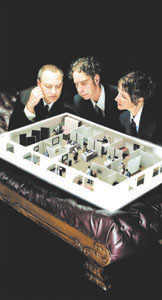
Wasn't This the Twist Ending of a 'Twilight Zone'?: Left to right, Mark Achbar, Joel Bakan and Jennifer Abbott puzzle over the corporate world as the creative forces behind 'The Corporation.'
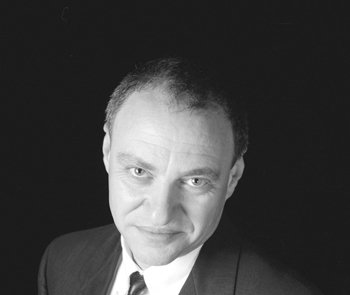
Corporate Whirled: Co-director Mark Achbar says he was 'astounded' at some of the things that came out of the mouths of CEOs in the interviews he did for 'The Corporation.'
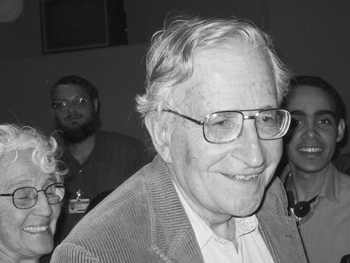
He Should Have Noam: Mark Achbar had done a film about Noam Chomsky before, so he was prepared for Chomsky's edgier comments in 'The Corporation.' 'Nothing that comes out of Noam's mouth shocks me,' quips Achbar.
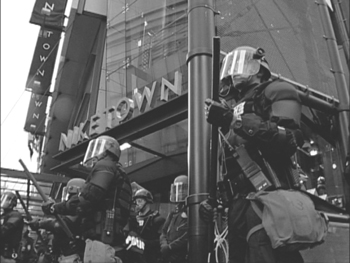
Company ... Halt: 'The Corporation' uses images like this from protests to show how corporate policies have been challenged around the world.
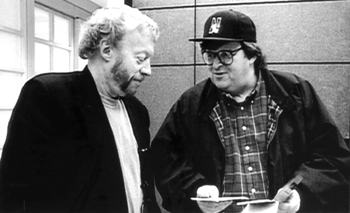
Plus 'One': In 'The Big One,' Michael Moore presented Nike CEO Phillip Knight with a round-trip ticket to Indonesia, where Nike was employing 14-year-old girls. As an interview subject in 'The Corporation,' Moore reveals what he left out of this scene.
From the June 16-23, 2004 issue of Metro Santa Cruz.